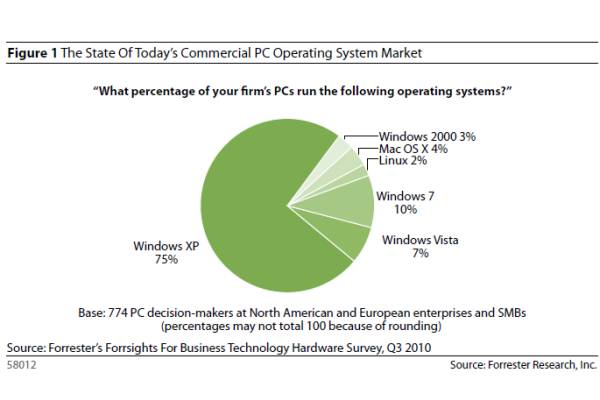Windows XP is still powering 75 percent of business computers in North America and Europe, according to Forrester Research. Compared to the world at large, where Windows XP just fell under 60 percent, this number is quite high.
Windows 7, meanwhile, is running on 10 percent of business PCs in North America and Europe. As businesses refresh their hardware by replacing old PCs and adding new ones, that percentage will grow considerably in the coming year. "Last year when we fielded a similar survey, only 7 percent of firms said they planned to deploy Windows 7 within the next 12 months or that they had already begun," according to the report. "This number has skyrocketed to 46 percent of firms now reporting that they have already begun or will begin deploying Windows 7 within the next 12 months." On top of that, 90 percent of the businesses contacted expect to migrate to Windows 7 eventually.

The data comes from 2,321 IT executives surveyed between June and August in the US, Canada, France, German, and the UK. These individuals represented all sizes of companies: from two employee tag-teams to enterprise juggernauts.
In related Windows 7 news, but on the complete other side of the customer spectrum, Microsoft announced that it is extending its student discount on the upgrade edition of Windows 7 Professional (32-bit or 64-bit) to 11 additional countries: Spain, Italy, Ireland, Portugal, Sweden, Norway, Finland, Denmark, Belgium, New Zealand, and Taiwan. Some are available this week but students from all these countries will definitely be accepted by end of next week. Students qualify for the limited-time offer if they have a valid e-mail address through a qualifying education institution and a PC that is currently running a genuine copy of Windows XP or Windows Vista.
https://www.techspot.com/news/40980-windows-7-powers-10-of-business-pcs-growth-to-explode.html